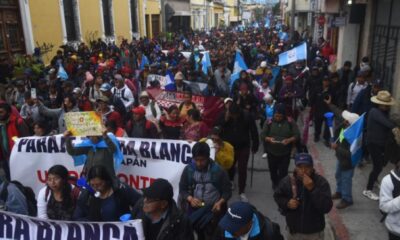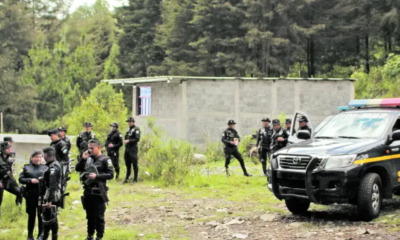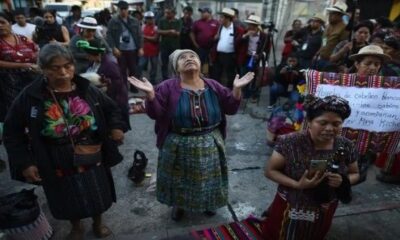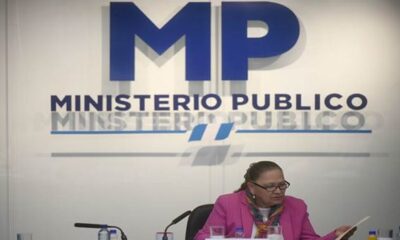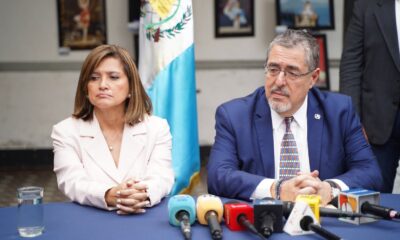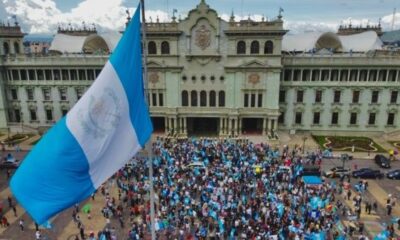Central America
President Arévalo highlights anti-corruption and drug trafficking efforts in first year report

Guatemalan President Bernardo Arévalo de León highlighted this Tuesday the progress made in the fight against corruption and drug trafficking as cornerstones of his first year at the helm of the Guatemalan government, during a session in Congress.
“We are in a process of transformation, but the commitment must be focused on eradicating the corruption that has oppressed us for so long,” said the president during the presentation of his first government report.
Arévalo de León urged lawmakers to “work together for structural change” in the country and thanked the president of the Legislative Body, Nery Ramos, for their joint efforts in the approval of various laws and the alliances formed during 2024.
The Guatemalan president highlighted as an achievement of his administration the denunciation of dozens of corruption structures embedded in state entities, such as fraud networks involving businessmen and former officials.
Central America
UN complaint filed against Costa Rica over detention of migrant children
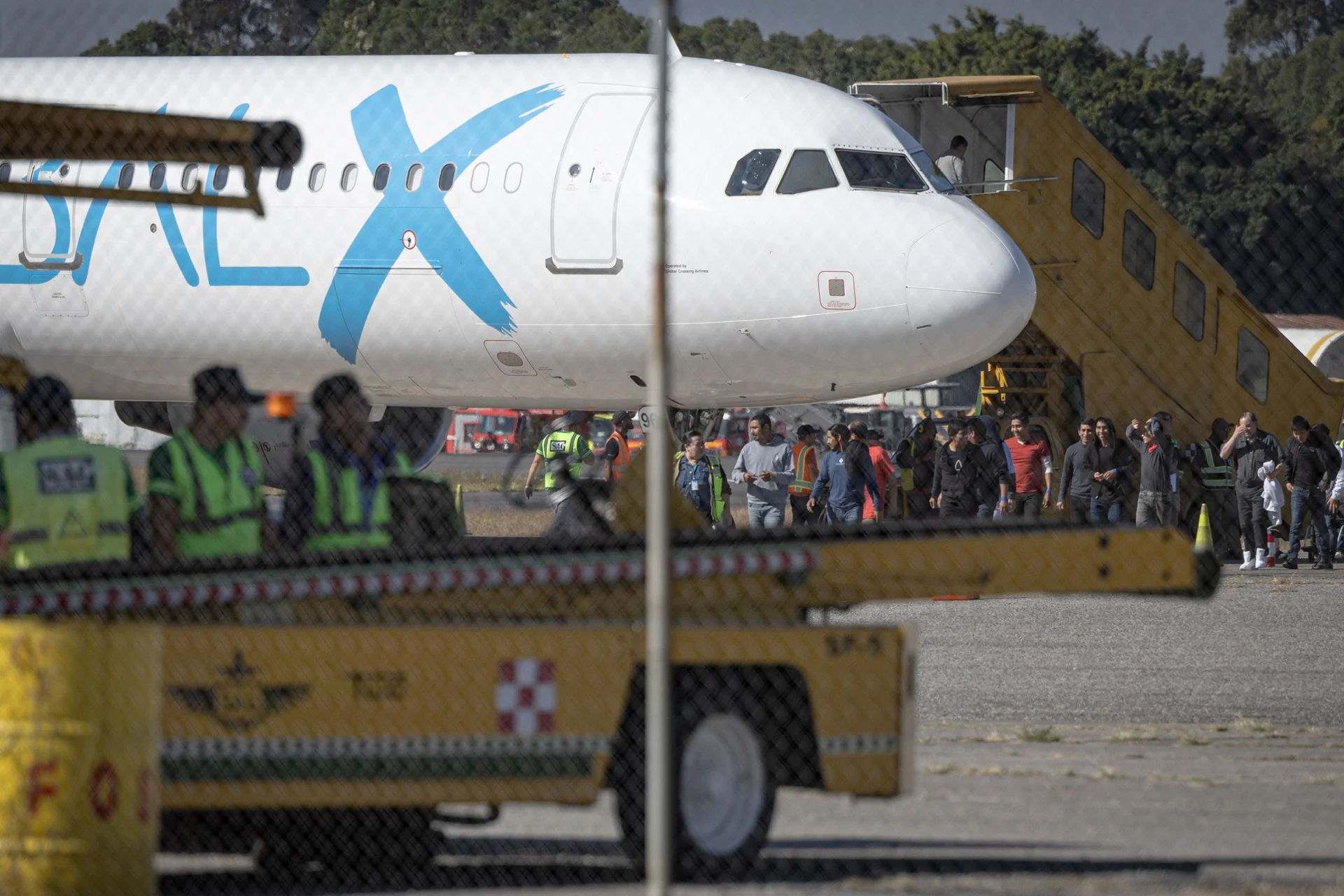
A group of human rights lawyers has filed a complaint against Costa Rica, alleging that the Central American nation violated the rights of dozens of migrant children by detaining them in a rural facility for nearly two months after they were deported from the United States in February.
The children — some as young as 2 years old — are part of a larger group of migrants, mainly from Afghanistan, China, Russia, and other Asian countries, who were deported from the U.S. as part of a broader immigration crackdown under former President Donald Trump.
Many had hoped to seek asylum in the U.S. and expressed fear about returning to their home countries. Instead, they were dropped off in Costa Rica and Panama, where they do not speak the local language. Originally intended as brief transit points, these countries have become a state of limbo, with migrants stuck for over 50 days.
Critics argue this is part of a U.S. strategy to “export” its deportation process, while human rights advocates warn that Costa Rica and Panama are becoming a “black hole” for deported migrants.
In Costa Rica, around 200 migrants — including 81 children — were taken to a rural migrant processing center near the border with Panama and held in a building that once served as a factory.
The complaint, filed Thursday night by the Global Strategic Litigation Council (GSLC) and other human rights groups, was submitted to the UN Committee on the Rights of the Child, alleging that Costa Rica breached international agreements under the Convention on the Rights of the Child.
Silvia Serna Román, one of the attorneys involved, said the migrants were detained without legal status and had no access to education or mental health services in their native languages. The prolonged detention is raising concerns about long-term psychological effects on the children, as many parents report signs of emotional distress such as isolation and sadness.
“These children are in a very crucial stage of development, and they’ve already fled difficult conditions in their home countries,” Serna Román said on Friday. “Now, they’re being subjected to prolonged detention and inhumane treatment. Parents are worried.”
Serna Román also said the migrants have had little access to legal counsel. The Costa Rican government has stated that detainees can leave the facility if they agree to return to their countries of origin or apply for asylum in Costa Rica.
Central America
Nicaraguan Exiles to Mark 7th Anniversary of 2018 Protests with Global Commemorations

The Nicaraguan opposition in exile announced on Thursday that it will commemorate the seventh anniversary of the April 2018 protests against the government of President Daniel Ortega and his wife, Rosario Murillo, with events in Costa Rica, the United States, and several European countries.
The commemorative activities—which will call for justice for the victims, as well as freedom and democracy for Nicaragua—will include religious services, public forums, cultural fairs, and other public gatherings, according to official announcements.
In April 2018, thousands of Nicaraguans took to the streets to protest controversial reforms to the social security system. The government’s violent response quickly turned the demonstrations into a broader call for the resignation of President Ortega, who is now 79 and has been in power since 2007.
The protests resulted in at least 355 deaths, according to the Inter-American Commission on Human Rights (IACHR), although Nicaraguan organizations claim the toll is as high as 684. Ortega has acknowledged “more than 300” deaths and maintains the unrest was an attempted coup d’état.
International
Arsenal stun Real Madrid at the Bernabéu to reach Champions League semifinals

Arsenal enjoyed a “historic night” on Wednesday after defeating Real Madrid 2-1 at the Santiago Bernabéu, knocking them out of the Champions League quarterfinals, midfielder Declan Rice said.
“It’s such a special night for this club, a historic night for this club,” said Rice, who scored twice in the first leg in London, speaking to TNT Sports.
The English international was named Man of the Match in both legs — the 3-0 win in London and the second leg in Madrid.
“It’s amazing. I knew we were on an upward trajectory and we’ve done incredibly well in this competition. We deserve it and we have full confidence in our coach. Reaching the semifinals is unbelievable,” Rice added.
-

 Central America4 days ago
Central America4 days agoHonduran Police Offer $135K for Tips Leading to the Arrest of Romeo Vásquez
-

 Central America3 days ago
Central America3 days agoPetro questions Ecuador’s vote, cites reports of military control and arrests
-

 International4 days ago
International4 days agoMPV Denounces Electoral Blockade as Secretary-General is Disqualified for May Elections
-

 International2 days ago
International2 days agoArsenal stun Real Madrid at the Bernabéu to reach Champions League semifinals
-

 International4 days ago
International4 days agoMaduro Plans Major Workers’ March on May 1st to Defend Venezuela’s Freedom
-

 International2 days ago
International2 days agoBogotá residents line up for yellow fever vaccine amid national alert
-

 International1 day ago
International1 day agoDominican ‘False Hero’ Arrested for Faking Role in Nightclub Collapse That Killed 231
-

 Central America1 day ago
Central America1 day agoNicaraguan Exiles to Mark 7th Anniversary of 2018 Protests with Global Commemorations
-

 International2 days ago
International2 days agoMexico refuses to restore ties with Ecuador while Noboa remains in office
-

 International2 days ago
International2 days agoDeSantis’ immigration crackdown sparks alarm in Venezuelan Communities in Doral
-

 International3 days ago
International3 days agoColombia: Search continues for missing limb of italian scientist found dismembered
-

 International2 hours ago
International2 hours agoACLU seeks emergency court order to stop venezuelan deportations under Wartime Law
-

 Central America2 hours ago
Central America2 hours agoUN complaint filed against Costa Rica over detention of migrant children
































































